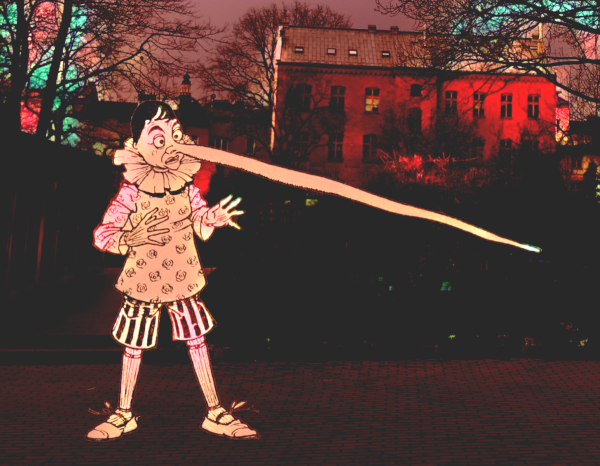
GMs sometimes fear that certain RPG abilities give away too much to the players. In GUMSHOE the abilities that most trigger these fears are the ones that actually act as the GM’s best friend.
Intuition in The Yellow King Roleplaying Game is one of these. We can get to that one later.
The classic example is Bullshit Detector—or as it is known in games set in a more genteel era, Assess Honesty.
GMs read the description and worry that the capacity to spot the telltale signs of deception will ruin their mysteries. When you think about it, though, very few mysteries hinge on the simple question of whether a suspect is lying.
Remember, the ability doesn’t necessarily tell the character what witnesses are lying about, just that they’re fudging or withholding something.
Drive this home in play by including witnesses who have an unrelated secret they’re anxious to to conceal, from investigators and everyone else. They’re denying professional screw-ups, cheating on their partners, cooking the books, indulging in a reputation-destroying vice, or hiding their involvement in crimes the investigators don’t care about.
With many investigative abilities, I’ll prompt players who don’t ask to use them. Not so with Bullshit Detector. Players who have it get used to actively invoking it.
When I want to make it dead obvious that a character isn’t telling the truth, I don’t mention Bullshit Detector. Instead I play the GMC as obviously shifty, with darting eyes, a worried look, or blurted phrases.
Even when the investigator questions the main bad guy, knowing that he’s lying rarely does more than confirm an existing suspicion. It rarely moves the team further toward the solution of the mystery. It certainly doesn’t let the group short-cut its way to the ending.
Sure, you’ve got a hunch that he’s hinky, but that doesn’t get you a warrant, or prove to the Ordo Veritatis head office that it’s okay to call in the commandos. It narrows down your range of leads but rarely even serves as a core clue moving you to the next scene.
Yeah, Bullshit Detector tells you that Old Man Grisby is pulling your leg about something. But that doesn’t tell you to go to the ghoul crypt, or reveal his immortal past, or lead you to the confederate who can be bribed into turning over his document collection.
As a GM I find Bullshit Detector most useful in ruling out deception. Players often fixate on innocent secondary characters, deciding that they must be the dread masterminds. Or they might not like what a witness has to tell them, because it contradicts their current speculation on the nature of the case. “Mrs. Chan doesn’t strike you as dishonest,” nudges the players back on track.
In actual play you’ll find yourself worrying less about preserving red herrings than in separating players from incorrect notions they’ve firmly stuck themselves to. Bullshit Detector helps you do that.



